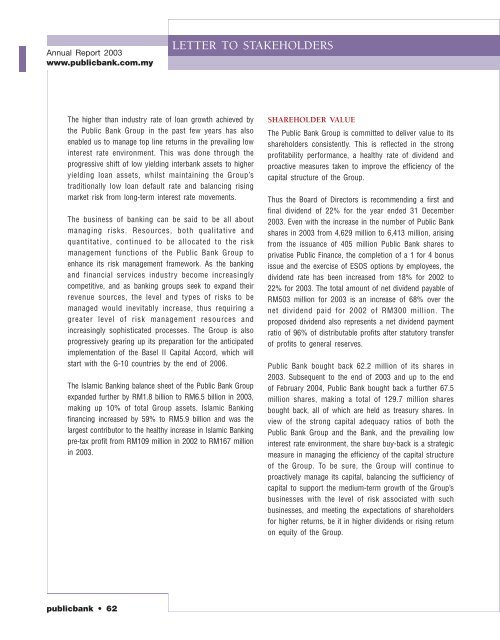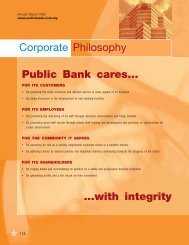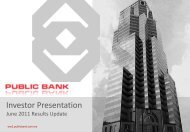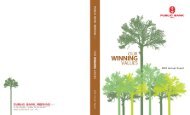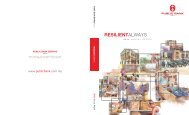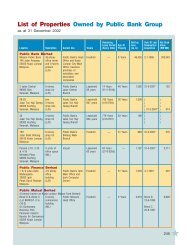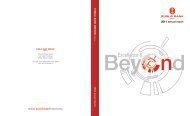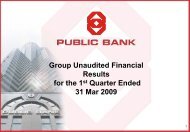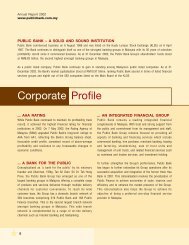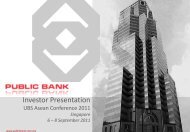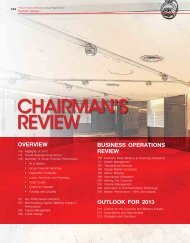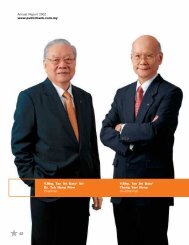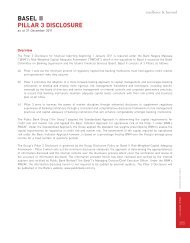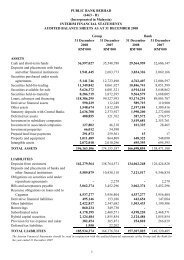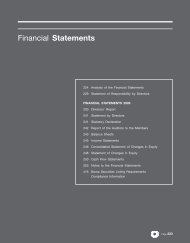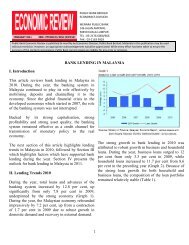Risk Management - Public Bank | PBeBank.com
Risk Management - Public Bank | PBeBank.com
Risk Management - Public Bank | PBeBank.com
- No tags were found...
You also want an ePaper? Increase the reach of your titles
YUMPU automatically turns print PDFs into web optimized ePapers that Google loves.
Annual Report 2003<br />
www.publicbank.<strong>com</strong>.my<br />
LETTER TO STAKEHOLDERS<br />
The higher than industry rate of loan growth achieved by<br />
the <strong>Public</strong> <strong>Bank</strong> Group in the past few years has also<br />
enabled us to manage top line returns in the prevailing low<br />
interest rate environment. This was done through the<br />
progressive shift of low yielding interbank assets to higher<br />
yielding loan assets, whilst maintaining the Group’s<br />
traditionally low loan default rate and balancing rising<br />
market risk from long-term interest rate movements.<br />
The business of banking can be said to be all about<br />
managing risks. Resources, both qualitative and<br />
quantitative, continued to be allocated to the risk<br />
management functions of the <strong>Public</strong> <strong>Bank</strong> Group to<br />
enhance its risk management framework. As the banking<br />
and financial services industry be<strong>com</strong>e increasingly<br />
<strong>com</strong>petitive, and as banking groups seek to expand their<br />
revenue sources, the level and types of risks to be<br />
managed would inevitably increase, thus requiring a<br />
greater level of risk management resources and<br />
increasingly sophisticated processes. The Group is also<br />
progressively gearing up its preparation for the anticipated<br />
implementation of the Basel II Capital Accord, which will<br />
start with the G-10 countries by the end of 2006.<br />
The Islamic <strong>Bank</strong>ing balance sheet of the <strong>Public</strong> <strong>Bank</strong> Group<br />
expanded further by RM1.8 billion to RM6.5 billion in 2003,<br />
making up 10% of total Group assets. Islamic <strong>Bank</strong>ing<br />
financing increased by 59% to RM5.9 billion and was the<br />
largest contributor to the healthy increase in Islamic <strong>Bank</strong>ing<br />
pre-tax profit from RM109 million in 2002 to RM167 million<br />
in 2003.<br />
SHAREHOLDER VALUE<br />
The <strong>Public</strong> <strong>Bank</strong> Group is <strong>com</strong>mitted to deliver value to its<br />
shareholders consistently. This is reflected in the strong<br />
profitability performance, a healthy rate of dividend and<br />
proactive measures taken to improve the efficiency of the<br />
capital structure of the Group.<br />
Thus the Board of Directors is re<strong>com</strong>mending a first and<br />
final dividend of 22% for the year ended 31 December<br />
2003. Even with the increase in the number of <strong>Public</strong> <strong>Bank</strong><br />
shares in 2003 from 4,629 million to 6,413 million, arising<br />
from the issuance of 405 million <strong>Public</strong> <strong>Bank</strong> shares to<br />
privatise <strong>Public</strong> Finance, the <strong>com</strong>pletion of a 1 for 4 bonus<br />
issue and the exercise of ESOS options by employees, the<br />
dividend rate has been increased from 18% for 2002 to<br />
22% for 2003. The total amount of net dividend payable of<br />
RM503 million for 2003 is an increase of 68% over the<br />
net dividend paid for 2002 of RM300 million. The<br />
proposed dividend also represents a net dividend payment<br />
ratio of 96% of distributable profits after statutory transfer<br />
of profits to general reserves.<br />
<strong>Public</strong> <strong>Bank</strong> bought back 62.2 million of its shares in<br />
2003. Subsequent to the end of 2003 and up to the end<br />
of February 2004, <strong>Public</strong> <strong>Bank</strong> bought back a further 67.5<br />
million shares, making a total of 129.7 million shares<br />
bought back, all of which are held as treasury shares. In<br />
view of the strong capital adequacy ratios of both the<br />
<strong>Public</strong> <strong>Bank</strong> Group and the <strong>Bank</strong>, and the prevailing low<br />
interest rate environment, the share buy-back is a strategic<br />
measure in managing the efficiency of the capital structure<br />
of the Group. To be sure, the Group will continue to<br />
proactively manage its capital, balancing the sufficiency of<br />
capital to support the medium-term growth of the Group’s<br />
businesses with the level of risk associated with such<br />
businesses, and meeting the expectations of shareholders<br />
for higher returns, be it in higher dividends or rising return<br />
on equity of the Group.<br />
publicbank • 62


